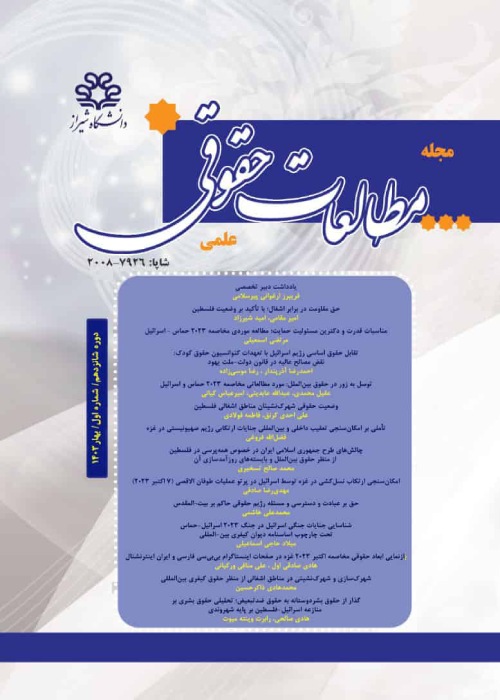The right to worship and access and the issue of the legal regime governing Jerusalem
The Israeli-Palestinian conflict remains one of the most complex and intractable challenges facing the international community. Central to this conflict is the question of Jerusalem's status. Jerusalem holds profound religious significance for Judaism, Christianity, and Islam, each with holy sites located within the city. The right to worship and access to these sites for all faiths must be a key consideration in any final resolution. Both the Israeli government and the Palestinian Authority view Jerusalem as their capital, making control of the city a critical red line for both parties.
This research seeks to propose a potential solution to the Israeli-Palestinian conflict based on the principle of freedom of worship and access to Jerusalem for followers of all three Abrahamic religions. Drawing upon the teachings of international human rights law and Islamic jurisprudence, the paper argues that a framework guaranteeing such access can be established.
The research methodology employs analytical reasoning with a comparative and interdisciplinary approach. Specifically, the paper compares and adapts the teachings of Islamic jurisprudence with those of international law, particularly the international human rights system, as they relate to the issue at hand. Based on this analysis, the concept of recognizing Jerusalem as an independent entity emerges as a potential solution.
An independent Jerusalem could guarantee the right of access for all religious groups to their holy sites. This aligns with the principles of the international human rights system, Islamic jurisprudence, and Islamic legal foundations. Moreover, it fulfills the objectives of Sharia law concerning freedom of worship and access. Reconsidering the independence plan through the lens of human rights and religious texts reveals its potential for greater success compared to other conflict resolution proposals.
Therefore, this research explores the concept of internationalizing and recognizing Jerusalem as an independent entity. It examines how this concept aligns with the right to worship and access, potentially reducing the conflict's intensity and paving the way for a final resolution. The paper will also discuss the functionality and challenges associated with this plan.
Key findings from the research analysis and proposal include:
Jerusalem's Significance in Abrahamic Religions:Judaism, Christianity, and Islam all hold Jerusalem in high regard due to its historical and religious significance. Specific places of worship for each religion are located within the city.
The Right to Worship and Access in Human Rights:The right to worship and access to holy sites is a fundamental principle enshrined in human rights documents and the international human rights system. This right encompasses the freedom to conduct individual and communal worship, as well as the freedom to build and maintain places of worship.
Respect for Religious Symbols in Islam:The Quran emphasizes the principle of "freedom of belief" alongside "respect for religious rituals, symbols, and figures." This principle extends to protecting and defending places of worship belonging to other religions.
Jerusalem's Status in the Partition Resolution:The United Nations General Assembly Resolution 181, adopted in 1947, envisioned Jerusalem as an independent corpus separatum (separate entity). The need for Jerusalem's independence has been echoed in other international documents.
Alignment with Islamic and Human Rights Principles:Recognizing Jerusalem's independence aligns with the teachings of the international human rights system, Islamic jurisprudence, and Islamic legal foundations. It upholds the objectives of Sharia law concerning freedom of worship and access.
Guaranteeing Access and Reducing Conflict:An independent Jerusalem would guarantee the right of access for followers of all religions to their holy sites. Defining the legal status of Jerusalem and ensuring access could potentially lessen the intensity of the Israeli-Palestinian conflict and render religious justifications for violence obsolete.
Favorable Conflict Resolution Scenarios:Due to its alignment with human rights principles and relevant resolutions from the United Nations Security Council, General Assembly, and other international bodies, conflict resolution scenarios based on Jerusalem's independence hold greater promise.
Challenges and Realities:The biggest challenge to the independence plan is its potential incompatibility with the current discourse of both parties involved in the conflict. However, political solutions are often driven by realities on the ground rather than ideals. Furthermore, the disruption of regional geography caused by Israeli policies may obstruct the implementation of the plan.
- حق عضویت دریافتی صرف حمایت از نشریات عضو و نگهداری، تکمیل و توسعه مگیران میشود.
- پرداخت حق اشتراک و دانلود مقالات اجازه بازنشر آن در سایر رسانههای چاپی و دیجیتال را به کاربر نمیدهد.


